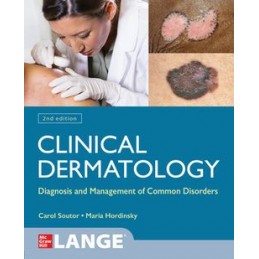- Obniżka


 Dostawa
Dostawa
Wybierz Paczkomat Inpost, Orlen Paczkę, DHL, DPD, Pocztę, email (dla ebooków). Kliknij po więcej
 Płatność
Płatność
Zapłać szybkim przelewem, kartą płatniczą lub za pobraniem. Kliknij po więcej szczegółów
 Zwroty
Zwroty
Jeżeli jesteś konsumentem możesz zwrócić towar w ciągu 14 dni*. Kliknij po więcej szczegółów
The most accessible, concise guide to dermatology—updated with new images and new chapters!
This authoritative, evidence-based guide provides the information and insight you need to accurately assess and treat the most common skin disorders. Updated with new chapters and new content, this second edition reflects the latest findings and clinical protocols.
Features::
Opis
TABLE OF CONTENTS
I. FUNDAMENTALS OF DIAGNOSIS AND TREATMENT
1. Structure and Functions of the Skin
2. Morphology and Terminology of Skin Lesions
3. History and Physical Examination of the Skin,Hair, and Nails
4. Diagnostic Procedures
5. Principles of Diagnosis
6. Principles of Management
7. Dermatologic Procedures
II. DISEASE-BASED CHAPTERS
8. Dermatitis
9. Psoriasis and Other Papulosquamous Diseases
10. Superficial Fungal Infections
11. Viral Infections of the Skin
12. Bacterial Infections
13. Infestations and Bites
14. Urticaria and Drug Rashes
15. Acne, Rosacea, and Related Disorders
16. Benign Tumors and Vascular Lesions
17. Actinic Keratosis, Basal, and Squamous CellCarcinoma
18. Nevi and Melanoma
19. Hair Disorders
20. Nail Disorders
21. Pigment Disorders
22. Immunobullous Diseases
23. Erythema Multiforme, Stevens–JohnsonSyndrome, Toxic Epidermal Necrolysis, Staphylococcal Scalded Skin Syndrome
24. Skin Signs of Systemic Disease
III. PROBLEM-BASEDCHAPTERS
25. The DifferentialDiagnosis of Purpura
26. Pruritus in Patients with No Underlying SkinDisease
27. Fever and Rash
28. Hospital-Acquired Rashes
29. Leg Ulcers
30. Skin Diseases of the Scalp
31. Skin Diseases of the Face
32. Skin Diseases of the Arms
33. Skin Diseases of the Hands
34. Skin Diseases of the Trunk
35. Skin Diseases of the Legs
36. Skin Diseases of the Feet
37. Skin Diseases Involving Multiple BodyRegions
38. Diseases of the Oral Cavity
39. Diseases of the Genitals and Perineum
40. Cosmetic Concerns
NEW CHAPTERS
41. Skin of Color
42. Tropical and Wilderness Medicine
43. Telemedicine
44. Pediatric Dermatology
45. Cutaneous Disorders in the Immunosuppressed Patient
46. Complementary Medicine for Cutaneous Disorders
47. Occupational Skin Diseases
48. Dermoscopy
49. Dermatopathology
50. LGBTQ Populations
51. Geriatric Populations
52. Cases and Q&A
Indeks: 89852
Autor: Matthias Hofer
Indeks: 17952
Autor: Anna Lipińska
Indeks: 18043
Autor: Vivien Spitz
Przerażające świadectwo nazistowskich eksperymentów na ludziach
Indeks: 18140
Autor: Kamil Koszela
Seria W gabinecie lekarza POZ
Indeks: 18170
Autor: Janusz Milanowski
Seria W gabinecie lekarza specjalisty. Alergologia i pulmonologia.
